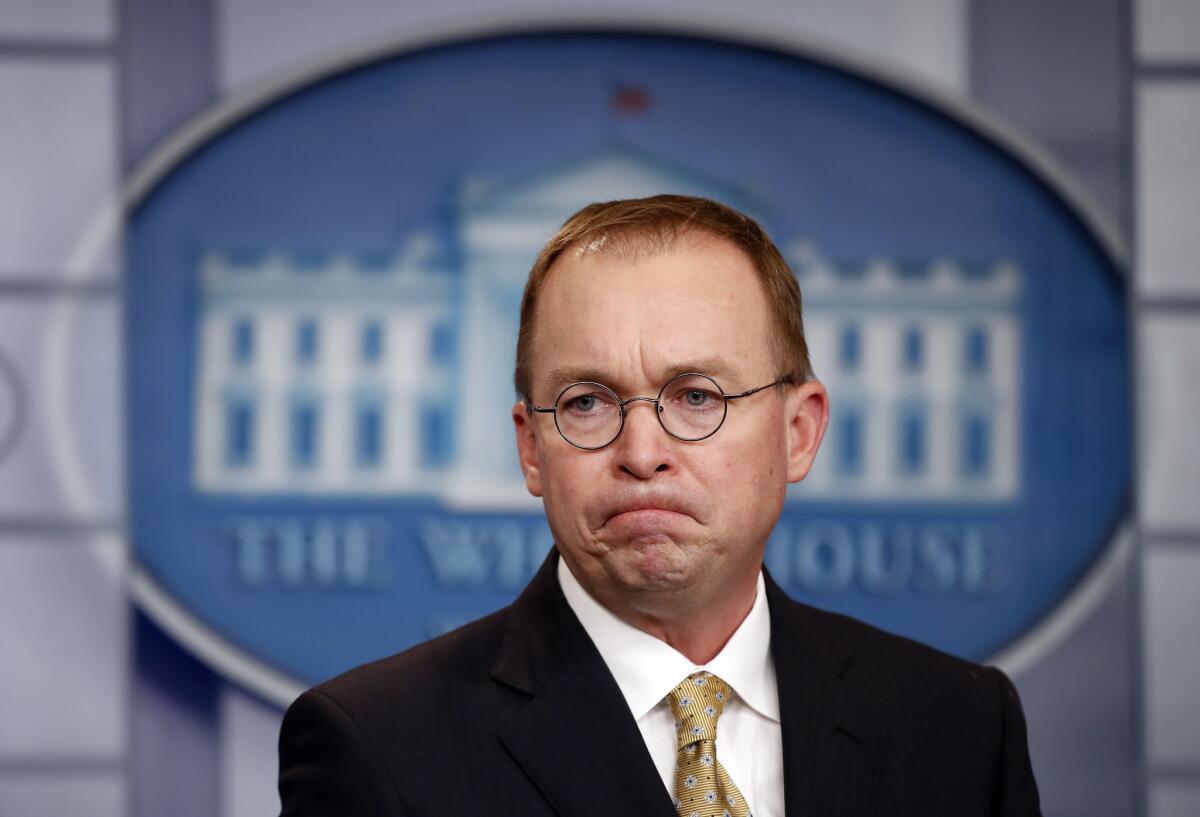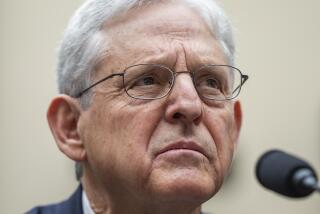Opinion: Mick Mulvaney to Democrats: You and your subpoenas can drop dead

One of the biggest obstacles for House Democrats as they try to gather evidence in their impeachment inquiry is the clock. Conversely, the shrinking amount of time before the 2020 elections may be Mick Mulvaney’s best ally — assuming that silence is his best option, which it may not be.
Mulvaney, the acting White House Chief of Staff and technically still the director of the Office of Management and Budget, can answer one of the central questions of the inquiry: Why, exactly, did the White House freeze nearly $400 million in badly needed aid to Ukraine? But he is refusing to testify, and the House may not be able to force him to do so before the unofficial clock runs out on the inquiry. There’s no set time limit, but Democrats are understandably reluctant to let the process drag on deep into the election year.
The House Intelligence Committee subpoenaed Mulvaney to testify Friday before the impeachment inquiry that three House committees are conducting. Mulvaney ignored the subpoena and instead sought to join a lawsuit that former Trump national security aide Charles Kupperman brought to challenge the subpoena Kupperman had received. When Kupperman and the Democrats opposed that effort, Mulvaney’s lawyers reportedly told the court that he would not challenge his own subpoena. Instead, they said, he plans to follow President Trump’s order, backed by an opinion from the Justice Department, and simply refuse to testify.
His move highlights how limited Congress’ power is to enforce its subpoenas. A pair of reports by the Congressional Research Service point out that lawmakers have three ways to compel testimony from a recalcitrant witness, only two of which are practical. And neither of those may be effective in this instance.
First, the House could order its sergeant at arms to bring Mulvaney before the full House or a designated committee for what amounts to a trial on charges of contempt of Congress. If the House determined Mulvaney guilty, he could be confined or, possibly, fined. But doing so would raise separation-of-powers questions that would prompt lengthy appeals. As a federal judge noted in a case pitting the House Judiciary Committee against President George W. Bush’s counsel Harriet Miers, exercising this inherent contempt power through “arrest and confinement of a senior executive official would provoke an unseemly constitutional confrontation that should be avoided.”
Second, the House could vote to hold Mulvaney in criminal contempt, then ask the Justice Department to enforce the citation by presenting the case to a federal grand jury. It’s abundantly clear that the Department of Justice would not. Under the Obama and Bush administrations, the department ignored similar findings four times, so there’s plenty of recent precedent for such a display of indifference.
Third, the House could go to court directly to try to enforce the Mulvaney subpoena. But that would lead to a long and bitter, although potentially useful, battle over the extent to which Congress can compel executive branch officials to testify, and particularly what they can testify about their discussions with the president. At issue is the long-standing claim by a series of administrations that close presidential advisors are absolutely immune to such congressional subpoenas on separation-of-powers grounds. That theory was rejected by a U.S. District judge in the Miers case, but has not been tested by any federal appeals court, and not by any court in the context of impeachment.
That’s where the clock comes in. Again, time is on Mulvaney’s side. Then again, it’s not clear that his silence is helping Trump.
House Intelligence Committee Chairman Adam B. Schiff (D-Burbank) has said that the impeachment inquiry will not be stalled waiting for the courts to weigh in. His committee has informed the subpoenaed witnesses that a refusal to testify will be interpreted as obstruction, laying the foundation for a potential article of impeachment.
Meanwhile, Trump and Mulvaney have offered a shifting variety of explanations for why the Ukrainian aid was put on hold (and none for why it was eventually released), including Trump’s desire to see European countries kick in more dollars and his supposed concern about Ukrainian corruption. But according to transcripts released by the House Intelligence Committee, several witnesses have testified privately in the impeachment inquiry that the aid wouldn’t be released until top Ukrainian officials committed to conducting two investigations that could help Trump politically: one that sought to paint former Vice President Joe Biden’s anti-corruption push in Ukraine as a smokescreen for a corrupt effort to shield a Ukrainian energy firm that employed his son, and one that sought to undermine evidence that Russia meddled in the 2016 election on Trump’s behalf. As far as they could tell, there was no concern about Ukrainian corruption in general — the focus was on just those two topics.
That’s damning. If Mulvaney were willing to testify under oath, he could try to present the handling of the Ukraine aid in a less nefarious light. But he’s not willing.
One of the defenses Republicans have advanced is that the aid was only delayed for three or four months and the Ukrainians never announced the investigations Trump sought, so what’s the big deal? University of Missouri law professor Frank O. Bowman III’s new book on the history of impeachment, “High Crimes and Misdemeanors,” doesn’t tackle this question directly, but it offers a quote from a couple of centuries ago that informed the articles of impeachment brought against President Nixon. It’s worth bearing in mind now.
In a ruling on a shipping dispute from 1808, Supreme Court Justice William Johnson said even an unsuccessful effort to abuse power is problematic. “If an officer attempt an act inconsistent with the duties of his station,” Johnson wrote, “it is presumed that the failure of the attempt would not exempt him from liability to impeachment. Should a president head a conspiracy for the usurpation of absolute power, it is hoped that no one will contend that defeating his machinations would restore him to innocence.”
More to Read
A cure for the common opinion
Get thought-provoking perspectives with our weekly newsletter.
You may occasionally receive promotional content from the Los Angeles Times.











